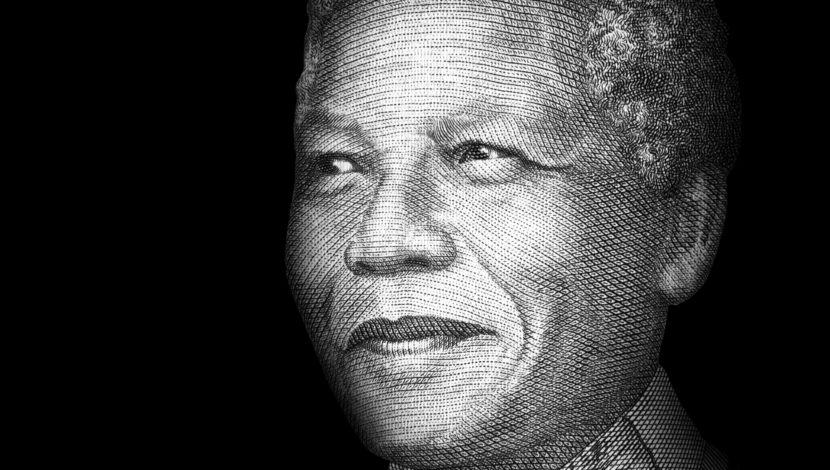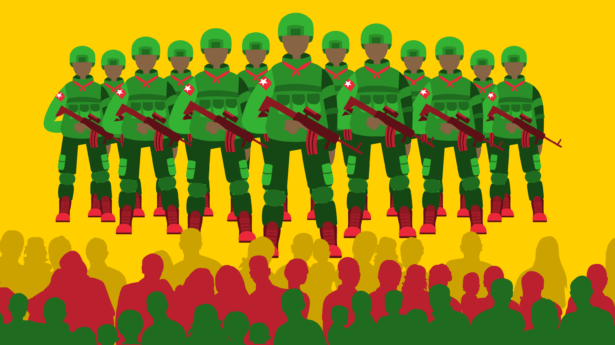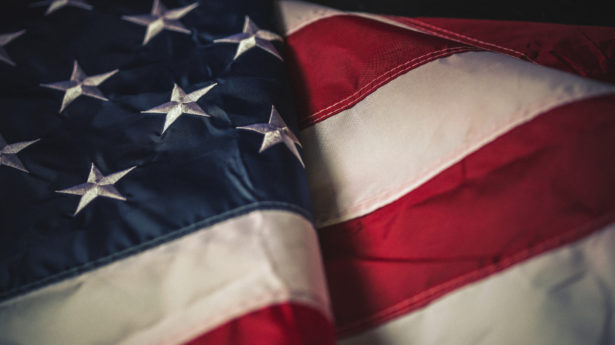The Unitarian Universalist Service Committee advances human rights through grassroots collaborations.
Mandela’s Legacy: A Deep Commitment to Justice for All

By Rev. Mary Katherine Morn on July 18, 2022
“[Nelson Mandela] showed that each and every one of us has the ability—and responsibility—to build a better future for all.” — António Guterres, Secretary-General of the United Nations in his message for July 18, International Nelson Mandela Day.
It’s been nearly nine years since the passing of human rights activist Nelson Mandela, who spent almost three decades of his life as a prisoner of conscience. It has been 60 years since he was first arrested with a group of his colleagues for planning to “overthrow the government.” They were working, of course, to end Apartheid, to bring liberation to Black South Africans who had been stripped of citizenship and so much more.
Mandela spent the first 18 years of that sentence living in an 8-foot-by-7-foot concrete cell. He slept on a thin mat on the floor, daily endured the abuse of White prison guards, and spent most of his days breaking rocks into gravel in a lime quarry that caused severe damage to his eyesight.
For the rest of his life, he’d live with poor eyesight, but his vision never faltered. Neither did his conscience or commitment falter. After his release from prison in the early 1990s, he would become president and serve one five-year term, laying the groundwork for an authentic form of democracy in South Africa.
Taking the time to reflect on Mandela’s legacy and vision is important to our own vision and commitment to human rights. As Mandela himself wrote:
“I have walked that long road to freedom. I have tried not to falter; I have made missteps along the way. But I have discovered the secret that after climbing a great hill, one only finds that there are many more hills to climb. I have taken a moment here to rest, to steal a view of the glorious vista that surrounds me, to look back on the distance I have come.”
There are many more hills to climb.
For one, we continue to work for a world where there are no prisoners of conscience, a world where peaceful protest for the sake of equity and inclusion is not criminalized.
How far that possible future seems.
- In Burma (also known as Myanmar), we have witnessed the horror of not only a genocide of ethnic and religious minorities—which has caused the displacement of almost a million Rohingya people, as well as hundreds of thousands of internally displaced peoples—but also a despotic rule of the military, including the imprisonment of countless people who dare to call for democracy and an end to the violence.
- In Honduras, Guapinol water defenders have faced illegal persecution and imprisonment due to their efforts to protect an invaluable resource for water in their communities against an extractive mining project. Only recently have the charges been dropped and the water defenders been allowed to move on with their lives and reintegrate. Their civil disobedience was vital to calling attention to the poisoning of the Guapinol River by a local mining company.
- And in the United States, Roe v. Wade has been completely dismantled by the Supreme Court leading to deeply concerning questions about the ability of health care providers and others who seek to provide reproductive healthcare for all who need it without threat of being criminalized and imprisoned.
These are just a few current examples of the criminalization of dissent, a hallmark of tyranny and authoritarianism. We have a long road to travel in building a world where there are no more prisoners of conscience.
This year, we mark Nelson Mandela International Day in the shadow of hearings related to the actions of some who would claim protests of conscience. It is important to be clear about the difference.
The intent of the January 6 resurrection was to obstruct Congress in engaging in a constitutionally protected exercise because a small group of people did not want to accept former President Trump’s loss. It was an attack against a constitutionally guaranteed aspect of the democratic process.
Protesters in Burma are organizing for a truly inclusive democratic nation.
Protests to stop oil and gas projects seek to protect the health and existence of local communities and end the pattern of displacement that these corporate projects initiate.
Health care providers and advocates breaking the law to support reproductive rights are serving community health.
Peaceful protest, for inclusion and equity, to hold government accountable for genocide, to address police brutality against people who are Black, to ensure community health, to protect resources and prevent extractive theft and displacement—these are the forms of protest that are increasingly being criminalized. While it is taking (quite literally) an act of Congress to hold accountable violent insurrectionists who are shamelessly calling for White supremacy.
Marge Percy helps us see, without any confusion, the difference in her poem “The Low Road.”
It goes on one at a time,
it starts when you care
to act, it starts when you do
it again and they said no,
it starts when you say We
and know who you mean,
and each day you mean one more.
On this Nelson Mandela International Day, and every day, let us commit ourselves to honoring Mandela’s legacy with our own vision and commitment to human rights. And every day, let us do our best to draw one more person with us in this long journey towards human rights and justice for all.
Image Credit: iStock—fotopoly

